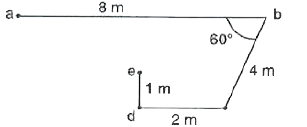A car accelerates from rest at constant rest a α t for same time after which it deaccelerates at constant rate β to come to rest. If total time taken is t then distance covered is given by :Solution in Kannada
x=t2(αβα+β)
x=t2(αβα−β)
x=t22(αβα−β)
x=t22(αβα+β)
The correct Answer is:d
x=distance covered during accelerated motion + disatnce covered during retarded motion
Let v be the maximum velocity reached.
∴X=v22α+v22β=v2(2β+2α2α.2β)
Since v=(αβα+β)t∴x=(αβα+β)2.t2.(α+β)2αβ
x=12(αβα+β).t2
Topper's Solved these Questions
- DESCRIPTION OF MOTION IN ONE DIMENSION Book:MODERN PUBLICATIONChapter:DESCRIPTION OF MOTION IN ONE DIMENSION Exercise:MULTIPLE CHOICE QUESTION (LEVEL-II)
Explore 54 Videos
- DESCRIPTION OF MOTION IN ONE DIMENSION Book:MODERN PUBLICATIONChapter:DESCRIPTION OF MOTION IN ONE DIMENSION Exercise:Recent Competitive Question
Explore 12 Videos
- CURRENT ELECTRICITYBook:MODERN PUBLICATIONChapter:CURRENT ELECTRICITYExercise:RECENT COMPETITIVE QUESTIONS
Explore 32 Videos
- DESCRIPTION OF MOTION IN TWO AND THREE DIMENSIONBook:MODERN PUBLICATIONChapter:DESCRIPTION OF MOTION IN TWO AND THREE DIMENSIONExercise:Revision TEST
Explore 36 Videos
Similar Questions
A man moves along the path abode as shown in the Fig. What is his displacement from the point of start?

View SolutionA train is moving slowly on a straight track with a constant speed of 2 m s−1 . A passengers in the train starts walking at a stready speed of 2 m s−1 to the back of the train in the opposite direction of the motion of the train. So to an observer standing on the platform directly in front of that passenger, the velocity of the passenger appears to be
View SolutionA battery of emf E has an internal resistance r. A variable resistance R is connected to the terminals of the battery. A current i is drawn from the battery. V is the terminal potential difference. If R alone is gradually reduced to zero, which of the following best describes i and V?
View SolutionThe torque of a force →F=−3ˆi+ˆj+5ˆk acting at a point is →τ. If the position vector of the point vector of the point is 7ˆi+3ˆj+ˆk, then →τ is :
View SolutionA car accelerates from rest at a constant rate for some time after which it decelerates at a constant rate β to come to rest. If the total time elapsed is t, the maximum velocity acquired by the car is given by :
View SolutionA car accelerates from rest at a constant rate for some time after which it decelerates at a constant rate beta to come to rest. If the total time elapsed is t, the maximum velocity acquired by the car is given by :
View SolutionA car at rest accelerates at a constant rate alpha for sometime after which it decelerates at a constant rate beta to come ot rest . If the total time elapsed is t second find the maximum velocity attained.
View SolutionA car accelerates from rest at a constant rate a for some time after which it retards at a constant rate to come to rest. If the time elapsed is t, maximum velocity reached is
View SolutionA car starting from rest, accelerates at a constant rate x for sometime after which it decelerates at a constant rate y to come to rest. If the total time elapsed is t, the maximum velocity attained by the car is given by
View SolutionA car accelerates from rest at a constant rate α for some time, after which it decelerates at a constant rate β and comes to rest . If the total time elapsed is t, then the maximum velocity acquired by the car is
View SolutionA car accelerates from rest at a constant rate α for some time,after which it decelerates at a constant rate β and comes to rest .If the total time elapsed is t,then the maximum velocity acquired by the car is
View SolutionA car accelerates from rest at a constant rate α for some time, after which it decelerates at a constant rate β and comes to rest. If the total time elapsed is t, then the maximum velocity acquired by the car is
View SolutionA car accelerates from rest at a constant rate alpha for some time, after which it decelerates at a constant rate beta and comes to rest. If the total time elapsed is t, then the maximum velocity acquired by the car is
View SolutionA car accelerates from rest at a constant rate alpha for some time, after which it decelerates at a constant rate beta and comes to rest. If the total time elapsed is t, then the maximum velocity aequired by the car is
View SolutionA car accelerates from rest at a constant rate alpha for sometime , after which it decelerates at a constant rate beta and comes to rest. If T is the total time elapsed, the maximum velocity acquired by the car is
View Solution